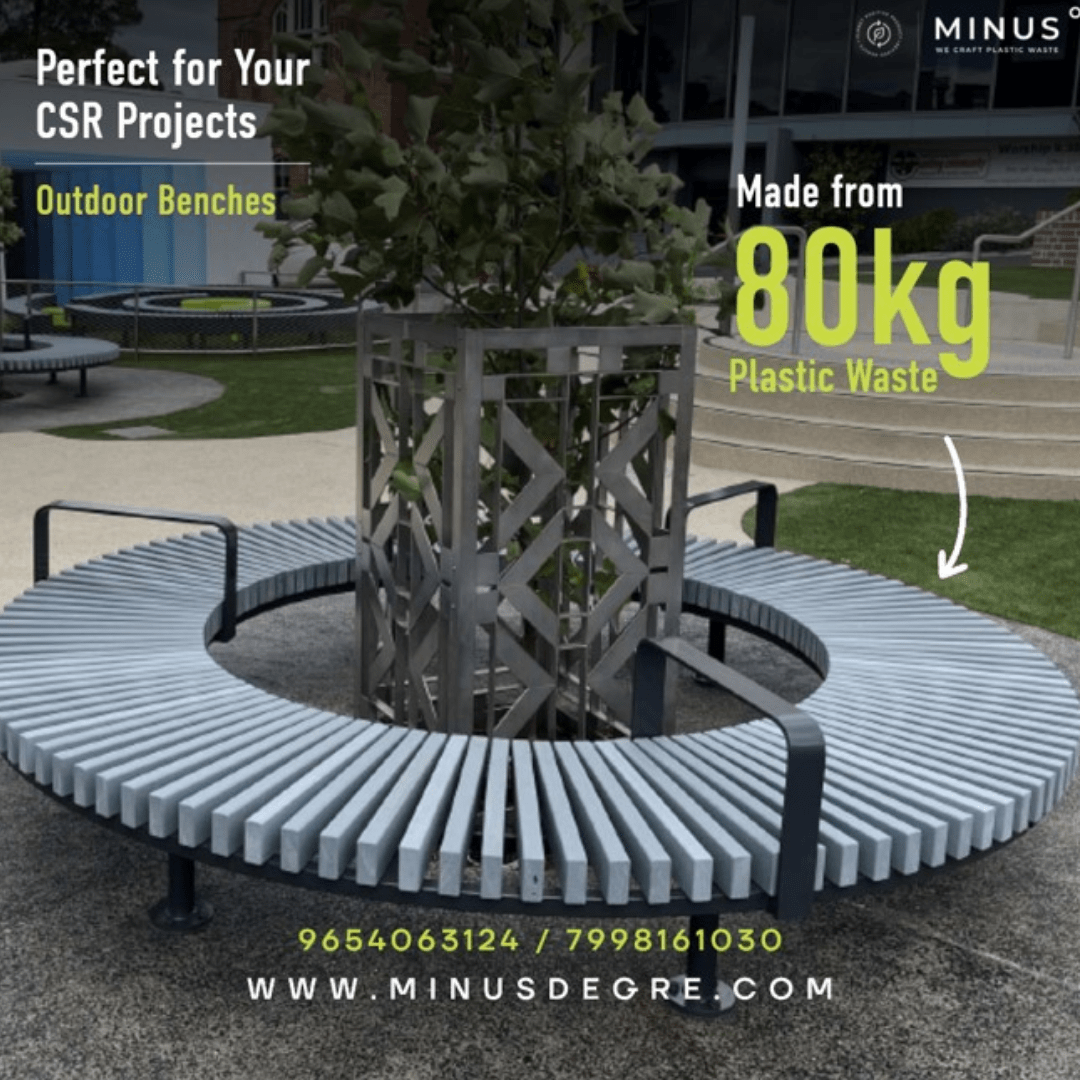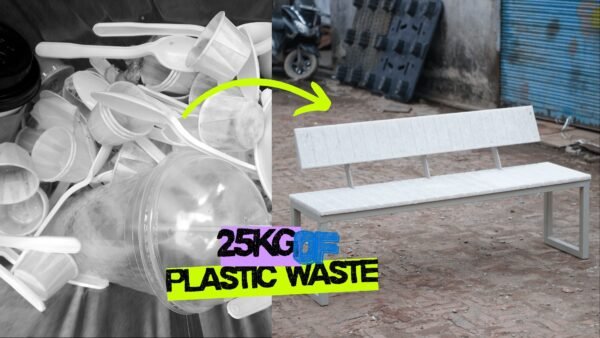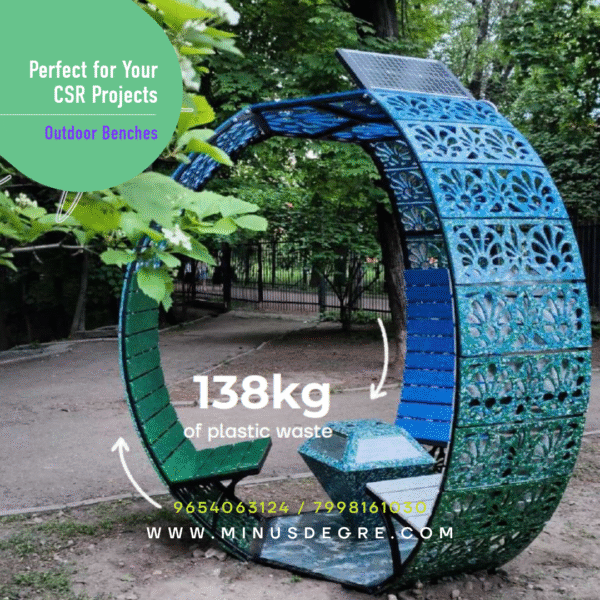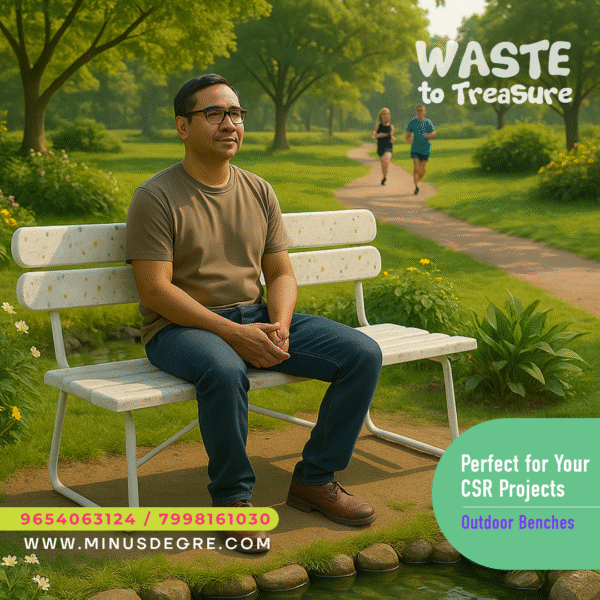In today’s world, where sustainability is no longer a choice but a responsibility, recycled benches have emerged as a symbol of conscious living. These aren’t just seats in a park or a garden—they are powerful reminders of how society can transform plastic waste into something functional, durable, and beautiful.
At Minus Degre, we craft impact-driven benches from plastic waste. Each bench is more than furniture; it’s a story of waste saved from landfills and oceans, and given a second life to serve communities.
Why Recycled Benches Matter for India
India generates millions of tonnes of plastic waste every year, and only a fraction of it is recycled. By choosing recycled benches, schools, corporates, and municipalities can contribute to waste reduction while creating long-lasting infrastructure.
Key Benefits:
- Durable & Weatherproof – Perfect for parks, campuses, and public spaces.
- Low Maintenance – No rusting, splintering, or painting needed.
- Eco-Friendly – Each bench diverts kilos of plastic waste from landfills.
- Customizable – Add branding or awareness messages for CSR impact.
CSR Benches – Furniture with Social Impact
Forward-thinking companies are now installing CSR benches as part of their sustainability initiatives. Imagine a school in Bangalore, a park in Mumbai, or a hospital in Hyderabad showcasing benches that proudly read: “Made from recycled plastic waste.”
CSR benches do more than provide seating—they educate, inspire, and leave a legacy. Every bench becomes a proof point of corporate commitment to sustainability.
Outdoor Furniture for Stronger Communities
Recycled benches are not just outdoor furniture—they are community builders. They bring people together in public spaces, schools, and workplaces. Crafted “for society, by the society,” each bench reflects the collective effort to make India’s cities greener.
Building a Greener Future with Recycled Benches
At Minus Degre, our mission is to transform waste into value. Through recycled benches, outdoor furniture, and CSR benches, we are helping schools, corporates, and governments reduce plastic pollution.
Every recycled bench installed is a step closer to a cleaner, greener India.
Final Thought
Recycling is not just about managing waste—it’s about reshaping the future. Recycled benches stand as proof that innovation and sustainability can go hand in hand.
It’s time to sit on a bench that tells the story of a better tomorrow.
https://www.youtube.com/shorts/d5aRtTKcm8E
FAQ
What are recycled benches made of?
Recycled benches are usually crafted from materials such as HDPE (high-density polyethylene), mixed plastics, or plastic lumber made from post-consumer plastic waste (bottles, packaging, etc.). These plastics are collected, cleaned, processed (melted / extruded), and formed into durable outdoor furniture shapes.
Are recycled plastic benches strong and durable enough for outdoor use?
Yes. They are built to withstand weather (rain, sunlight, humidity), resist rotting, warping, rust (compared to metal), splinters (compared to wood), and require low maintenance. Many recycled benches come with long warranties and are UV stable. This makes them ideal for parks, schools, public spaces.
What maintenance is needed for recycled benches?
Very little. Usually cleaning with mild soap & water, occasional rinsing is enough. They don’t require painting, varnishing, sealing or frequent treatment. Unlike wood, they don’t rot or get infested by termites; unlike metals, they don’t rust.
Are recycled benches more expensive than traditional wood or metal benches?
Initially, they may cost more depending on design, size, and quality, but over the lifespan, they tend to be cheaper because of lower maintenance and longer durability. Also, the environmental cost savings and CSR benefits add value.
Can recycled benches be customised for branding or CSR purposes?
Yes. Many manufacturers (including Minus Degre) offer customisation options: logo engravings, colour matching, modular design, etc., which makes them suitable for CSR benches in parks, institutions, or corporate spaces.
Do recycled benches fade or lose colour over time in Indian climate (sun, rain)?
Good quality recycled plastic benches are UV-stabilized, meaning they resist fading, warping, or becoming brittle under sun exposure. While extreme heat or prolonged sun may cause some colour changes over many years, the durability and retention are significantly better than untreated wood.
What is the cost-benefit for organisations adopting CSR benches made from recycled materials?
Organisations gain multiple benefits: sustainable reputation, compliance with CSR regulations, reduced impact on environment, long term cost savings (due to less maintenance/replacement), positive community impact. Also, such benches become visible proof of CSR efforts.




